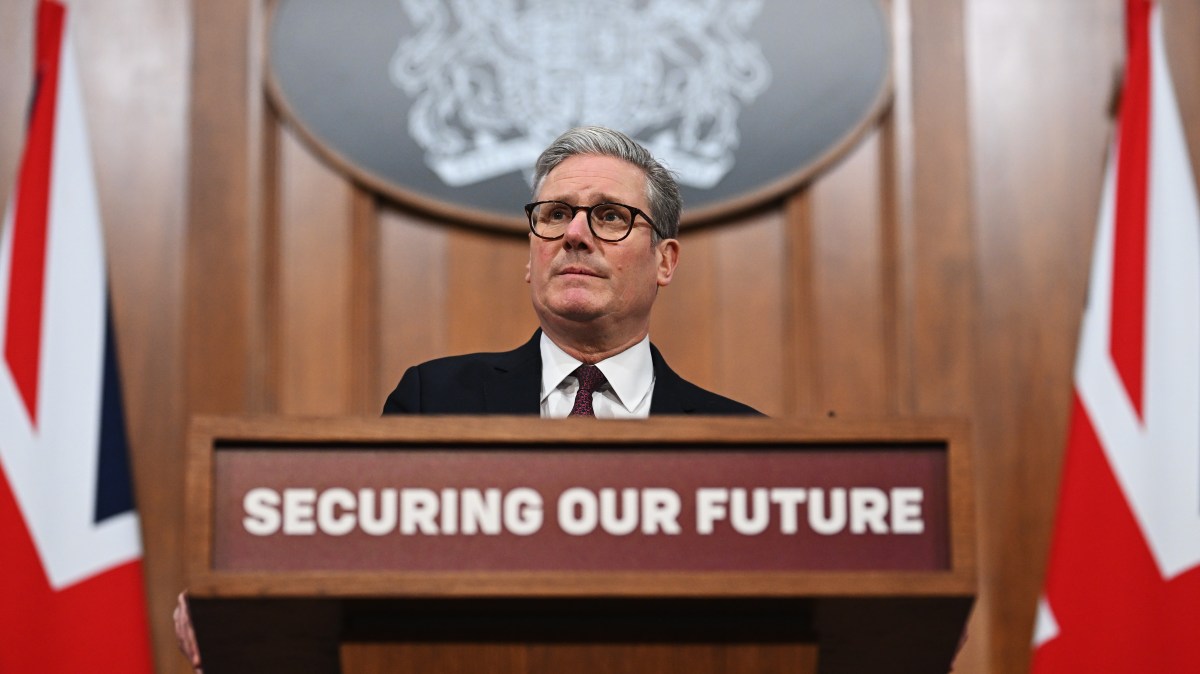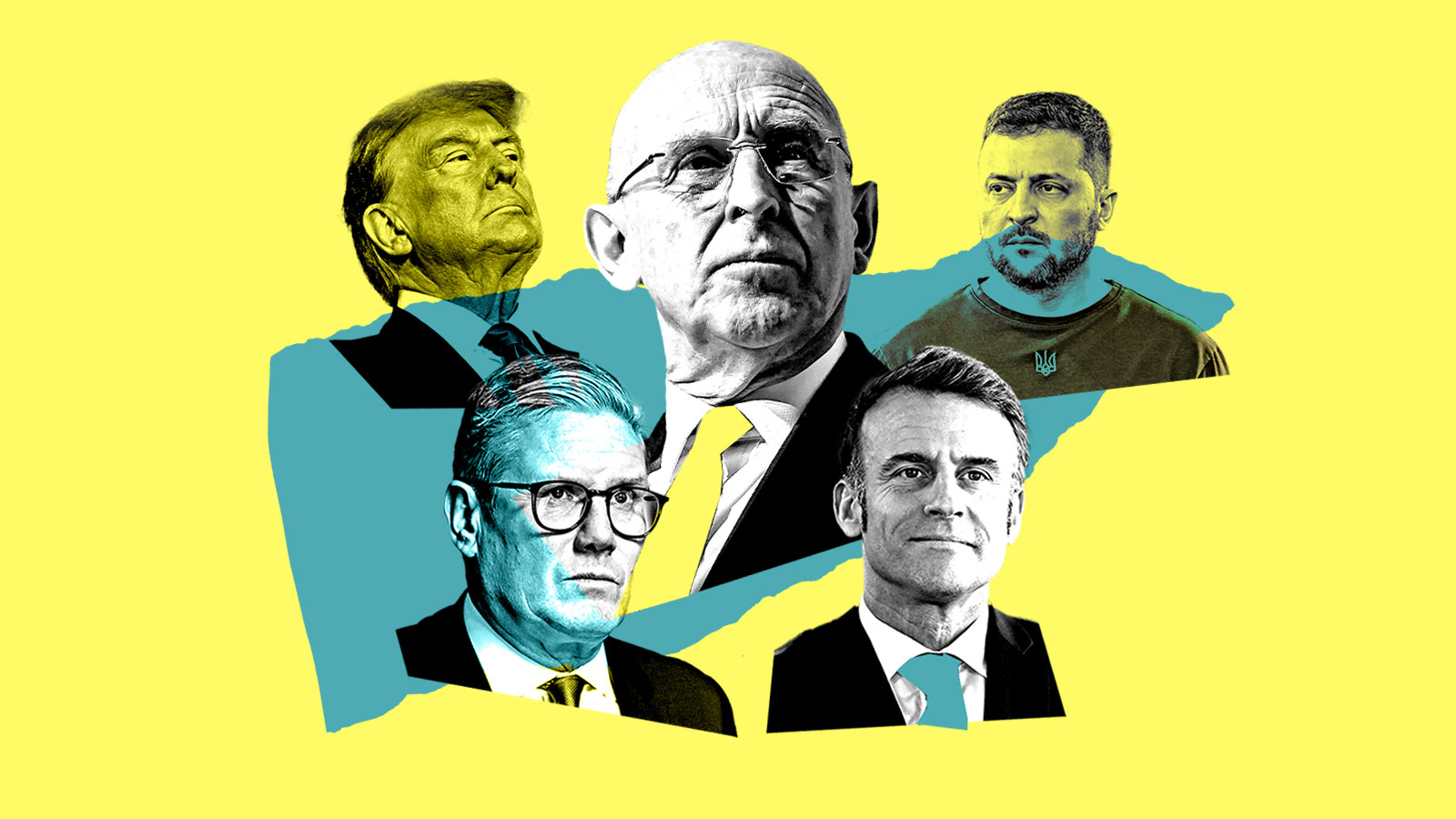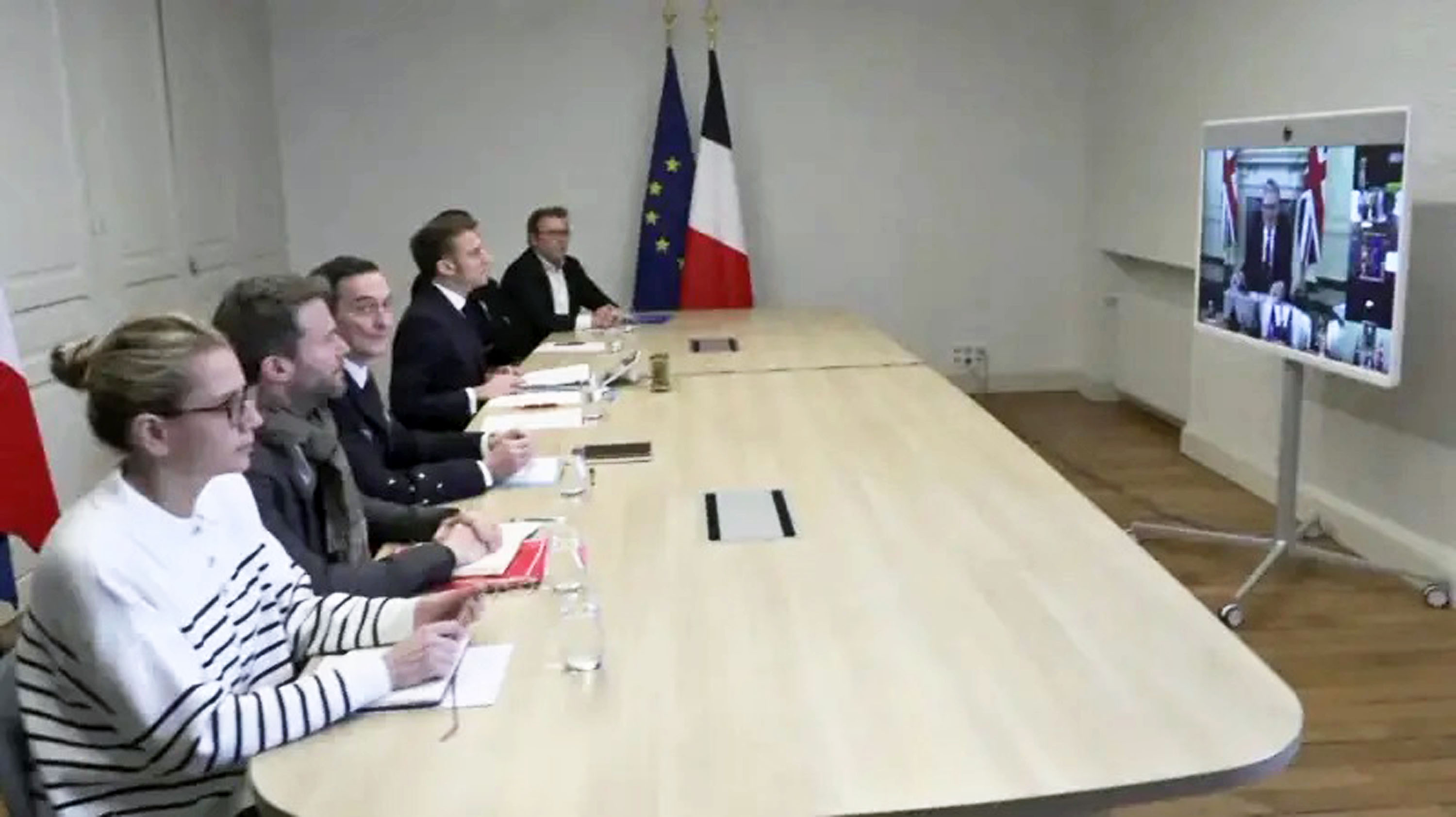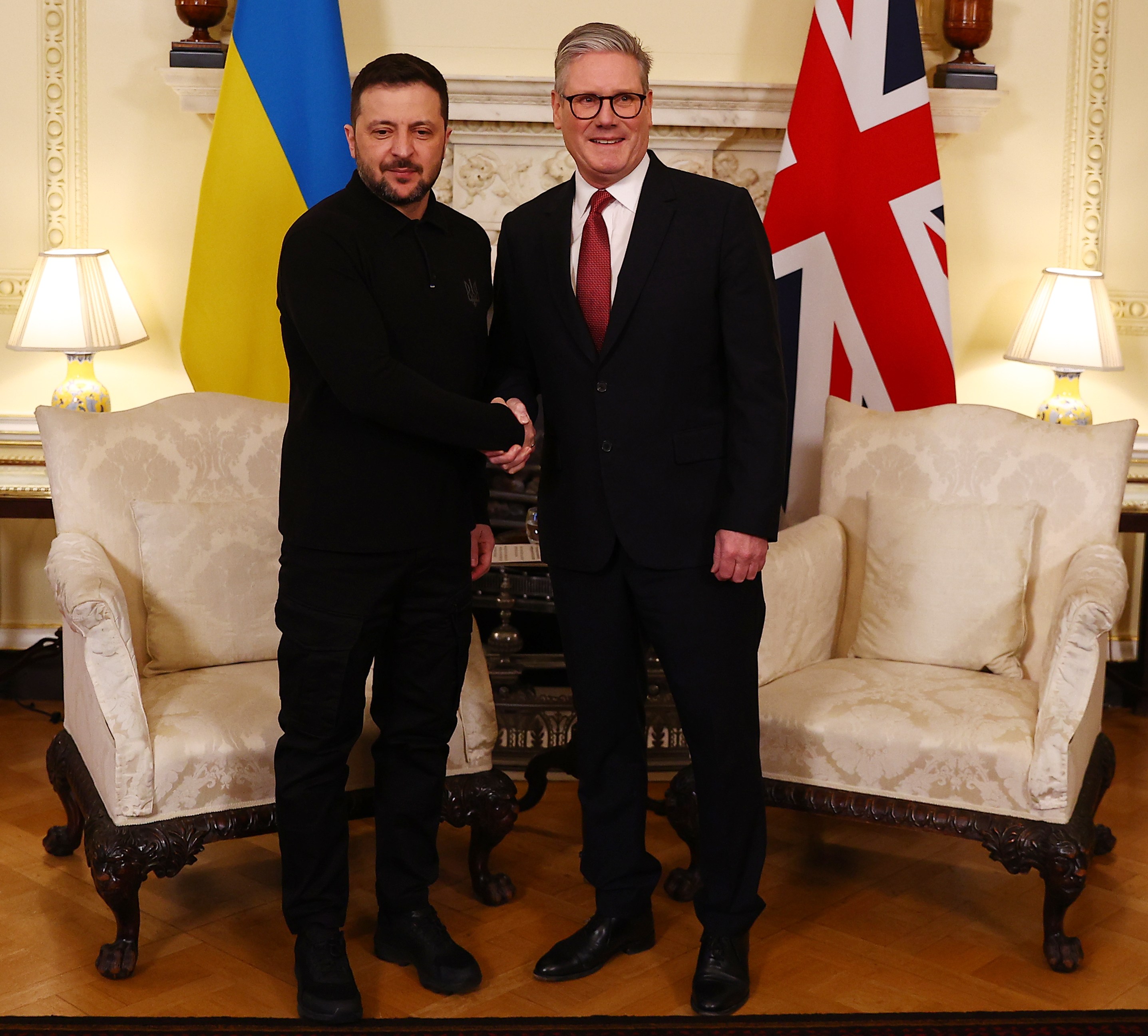The prime minister of Australia has said his country would consider requests to send peacekeeping troops to enforce a ceasefire in Ukraine.
Anthony Albanese, who joined the virtual meeting of 29 European and Commonwealth nations this morning, said Australia “stands with Ukraine and we will continue to do so for as long as it takes”.
He added: “Australia is open to considering any requests to contribute to a future peacekeeping effort in support of the just and lasting peace we all want for Ukraine.”
Western military leaders will be meeting on Thursday in the UK to discuss the next steps in supporting Ukraine through to a ceasefire.
President Zelensky said he does not know exactly what was discussed between US and Russian mediators in a meeting earlier this week.
On Thursday, Steve Witkoff, President Trump’s envoy, went to Moscow to deliver a ceasefire proposal to President Putin.
At a press conference this afternoon, Zelensky said: “We can’t know for sure what these people were discussing, but we understand that there will be many arguments to put Ukraine in the weaker position.”
He added that any potential ceasefire should be agreed without placing any conditions on either Ukraine or Russia.
President Zelensky has said western allies, including Britain, are interested in supporting a “strong Ukrainian army”.
He said “everyone understands that it is a responsibility of all of us and Ukraine is not capable of doing it on its own because it is a very substantial financial burden”.
The Ukrainian president made the comments at a press conference after a virtual meeting of 29 world leaders hosted by Keir Starmer.
On Thursday next week, western military leaders will meet in the UK to discuss practical support for Ukraine, including sending peacekeeping forces to enforce a possible ceasefire.
President Zelensky has appointed an official delegation to represent Ukraine in future peace talks with Russia.
According to a government decree published today, Ukraine’s president has chosen Andriy Yermak, his chief of staff, to head the delegation. Andriy Sybiga, the foreign minister, Rustem Umerov, the defence minister, and Pavlo Palisa, the deputy chief of staff, will also take part.
Analysis by Peter Conradi, Europe Editor
In a last minute change of plan, Giorgia Meloni was persuaded by Keir Starmer to take part in today’s virtual conference on Ukraine but the Italian leader has made clear that she will not contribute troops to the force envisaged by the Anglo-French led “coalition of the willing”.
The Italian government said it “intends to continue working with European and western partners and with the United States to define credible and effective security guarantees”, but reiterated that “national participation in a possible military force on the ground is not envisaged”.
Meloni has insisted that Italy shares the desire of its western allies to secure peace for Ukraine, but has cast doubts on the feasibility and effectiveness of the plan drawn up by Starmer and President Macron.
Senior members of her coalition have said they would only consider sending Italian soldiers to Ukraine as part of a broader peacekeeping mission mandated by the United Nations.
President Zelensky addressed the virtual meeting of the “coalition of the willing” earlier today.
The group of about 26 countries, mainly from Europe and the Commonwealth, met this morning to discuss how to support Ukraine through a potential ceasefire. A meeting of military leaders will take place next week.
“I addressed the meeting of European leaders stating that the path to peace must begin unconditionally,” the Ukrainian president said. “And if Russia doesn’t want this, then strong pressure must be applied until they do. Moscow understands one language.”
Please enable cookies and other technologies to view this content. You can update your cookies preferences any time using privacy manager.
Enable cookiesAllow cookies once
Keir Starmer has given more details about the meeting of military leaders scheduled to take place next week. The meeting was announced after a virtual conference of European and Commonwealth nations this morning.
“Robust and credible security arrangements are the best way to ensure that any deal ends in a lasting peace,” he said. “We agreed military planners would convene again in the UK this week to progress practical plans for how our militaries can support Ukraine’s future security.
“We will build up Ukraine’s own defences and armed forces and be ready to deploy as a coalition of the willing in the event of a peace deal, to help secure Ukraine on the land, at sea and in the sky.”
He added: “In the event of a ceasefire, we emphasised the need for strong monitoring arrangements, to ensure any violations of a deal are identified and called out.”
The prime minister said the “coalition of the willing” is preparing to provide both short term and long term military support to Ukraine, and added that discussions are under way to further tighten sanctions on Russia.
At a press conference, Caroline Wheeler, the political editor of The Sunday Times, asked Starmer what pressures European leaders can use to bring Russia to the negotiating table.
“The first is more military capability for Ukraine, and fresh commitments were put on the table this morning in that regard,” he said. “In terms of the sanctions, yes we want to tighten the sanctions further and we discussed this morning how much further we can go, including the question of frozen assets.”
Keir Starmer said he will continue seeking US support for policing a potential ceasefire, and revealed that Jonathan Powell, the UK’s national security adviser (NSA), was in Washington for talks yesterday.
The prime minister said “I’ve been clear it needs to be done in conjunction with the United States. We are talking to the US on a daily basis. My NSA was over there yesterday, he just arrived back this morning.”
He added that there has been progress in talks with Russia concerning a ceasefire over the past two weeks but that more pressure needs to be put on Putin to make him come to the negotiating table.
Keir Starmer has said European and Commonwealth nations are moving “into an operational phase” to support Ukraine in seeking a ceasefire deal.
The prime minister said at a press conference that the military leaders of nations including Britain, France, Canada and Australia will meet on Thursday next week in the UK to “put strong and robust plans in place to secure a peace deal”.
The press conference followed a virtual meeting of about 25 members of the so-called “coalition of the willing”, which was convened by Starmer earlier this month. Leaders have previously suggested sending peacekeeping troops to Ukraine in order to guarantee a potential ceasefire.
Analysis by Dominic Hauschild
“The coalition of the willing” is the grand name for the European and Commonwealth allies prepared to send peacekeepers to Ukraine to enforce any potential ceasefire. The term was coined by Keir Starmer at a meeting in London earlier this month.
In total, 14 countries signed up to the coalition, including France and Canada. By convening under an informal coalition, it allows leaders to pledge support without going through Nato, where pro-Russia nations would veto any official action.
Today, Starmer has reconvened a meeting of the coalition of the willing, with about 25 world leaders patching in via video. The aim is to prove to President Trump that Europe is serious about shouldering the defence burden.
A mission to train Ukrainian troops in their home country could establish a low-level allied military presence
JUSTIN TALLIS/AFP/GETTY IMAGES
European-led peacekeeping force planning is in its early stages, with military leaders discussing how to deploy troops in Ukraine while addressing political and security concerns.
The force’s participation could include countries like Turkey, Canada, and Australia, but some, like Italy, have ruled out sending troops.
Key issues include security guarantees from the US, the scale of the force, and the risk of drawing troops away from Nato commitments.
• Read in full: What a European-led peacekeeping force could look like
Russia’s army is gathering its forces to launch an attack on the Sumy region of Ukraine, President Zelensky has claimed.
“We are aware of this, and will counter it,” Zelensky said on social media this morning. “The build-up of Russian forces indicates that Moscow intends to keep ignoring diplomacy. It is clear that Russia is prolonging the war.”
Zelensky also rejected claims by Russia and Trump that Ukrainian troops have been encircled in the Kursk region. “Our troops continue to hold back Russian and North Korean groupings in the Kursk region,” he said. “There is no encirclement of our troops.”
President Zelensky, President Macron, and Mark Carney, the prime minister of Canada, have spoken during the video meeting.
In his opening remarks, Keir Starmer described it as an “important meeting” to catch up on developments since the in-person meeting of European leaders in London two weeks ago, including the US-Ukrainian proposal for an unconditional 30-day ceasefire.
Downing Street said that today’s meeting would also “delve further into how countries plan to contribute to the coalition of the willing”, before a “military planning session” is held next week.
Analysis by Dominic Hauschild
President Trump claimed that thousands of Ukrainian troops were surrounded by Russia’s military in Kursk, a city in western Russia. On social media last night, Trump said the situation could turn into a “horrible massacre, one not seen since the Second World War”.
But Ukrainian officials have denied their forces are surrounded. The military’s general staff said reports of the encirclement “are false and fabricated by the Russians for political manipulation”.
Kyiv seized Kursk last year in a gambit that appeared to pay off, although over the past two weeks Ukrainians have carried out a phased retreat of their occupation as Russian and North Korean forces hammer their positions. Ukraine now holds just 30 per cent of the land it seized last August.
Once again, Trump has been accused of parroting Moscow’s talking points. But the situation on the ground remains grim as a crucial bargaining chip in ceasefire negotiations starts to slip from Kyiv’s grasp.
President Putin would not accept peacekeepers from Nato or European nations, a former Russian prime minister has said.
Mikhail Kasyanov, who served under Putin between 2000 and 2004 before becoming an opposition leader, told the BBC’s Today programme that Putin wanted a conditional ceasefire “on his terms”.
Asked if Putin would accept a peacekeeping force in Ukraine, Kasyanov replied: “I don’t believe this, but he could accept if his terms and conditions are accepted, for instance the stop of military supplies, he could agree to just Indians and Brazilians and other friendly countries, troops from those countries but not from Nato nations or from Europe at all.”
John Healey, the defence secretary, centre, has been one of those working to reconcile the interests of Sir Keir Starmer and presidents Trump, Zelensky and Macron
After years of war came a breakthrough in peace talks, with Ukraine saying it was ready to accept a 30-day ceasefire proposal, leading to discussions among European and US leaders on how to protect Ukraine and ensure a lasting peace.
Diplomats worked behind the scenes to draft proposals for a peace deal, and now the focus is on whether President Putin will engage in negotiations.
• Read in full: Inside the delicate negotiations for a Ukraine peace deal
President Zelensky has shown that “Ukraine is the party of peace” by committing to a 30-day unconditional ceasefire, Starmer said.
By contrast Putin “is the one trying to delay” a peace deal, the prime minister told the meeting, which includes Nato and the EU commission as well as leaders from Europe, Canada, Australia and New Zealand.
Starmer said: “If Putin is serious about peace it is very simple, he has to stop his barbaric attacks on Ukraine and agree to a ceasefire. The world is watching. My feeling is that sooner or later he’s going to have to come to the table and engage in serious discussion.”
Keir Starmer during the video meeting of the “coalition of the willing”
LEON NEAL/GETTY IMAGES
President Putin will have to come to the negotiating table “sooner or later”, Sir Keir Starmer said as he opened talks with fellow world leaders.
The prime minister said the video meeting would be used to discuss three main objectives: strengthening Ukraine so they can defend themselves, “being prepared to defend any deal ourselves through a coalition of the willing”, and keeping up the pressure on Putin to “come to the table”.
Starmer added: “We can’t sit back and wait for that to happen, we have to be pushing ahead and preparing for peace, a peace that will be secure and will last.”
President Macron of France joined the talks
SKY NEWS
While Keir Starmer hosts virtual talks with the “coalition of the willing”, Russia’s deputy foreign minister is visiting North Korea.
Andrei Rudenko was in the capital, Pyongyang, today to pay tribute to “the fallen soldiers of the Soviet Army” during the Korean War, according to state media.
Thousands of North Korean troops have been sent to Russia to fight against Ukrainian forces in the Kursk region.
Russian planes briefly entered South Korea’s air defence zone today, according to South Korea’s military, which confirmed the planes did not violate the country’s airspace.
President Putin at a military headquarters in Kursk on Wednesday
UNPIXS
President Putin, once a master of geopolitical strategy, now finds himself cornered as he faces a proposal for a 30-day ceasefire, which he does not want to accept.
Despite significant losses and limited territorial gains, his war in Ukraine has failed to achieve its primary goal of overthrowing Ukraine’s pro-Western leadership and returning the country to Moscow’s dominion.
• Read in full: Putin’s options explained
Giorgia Meloni has to act as a “bridge” between Europe and Donald Trump, a member of Italy’s ruling party has said.
The Italian prime minister is trying to help the US president understand the situation in Ukraine, Giangiacomo Calovini told BBC Radio 4’s Today programme.
“Meloni has a good relation with Trump,” said Calovini, an MP for the Brothers of Italy party and a member of the foreign affairs committee. “She has tried to explain that for us in Europe, Putin is a real big problem, and the invasion is from Russia. But I think the priority here is not to divide the United States and Europe.
Calovini said that Italy was not opposed to sending troops to help keep the peace in Ukraine, noting that Italian forces are currently in Lebanon, Africa and the Balkans. However he claimed it was “impossible” at the moment without a clear mandate.
World leaders need to increase economic pressure on Russia to force President Putin into negotiations, Sir Keir Starmer said before today’s meeting of the “coalition of the willing”.
The virtual meeting this morning involves about 25 countries including Canada, Ukraine, Australia, New Zealand, as well as Nato and the EU commission.
Yesterday night the prime minister said: “If Russia finally comes to the table, then we must be ready to monitor a ceasefire to ensure it is a serious and enduring peace, if they don’t, then we need to strain every sinew to ramp up economic pressure on Russia to secure an end to this war.”
Russia and Ukraine continued to trade drone attacks overnight as world leaders pushed for a ceasefire.
Ukraine’s air force claimed Russia launched two ballistic missiles and 178 drones, of which 130 were shot down by air defences.
Russia’s defence ministry said it had intercepted 126 Ukrainian drones overnight. Russian forces also claimed to have retaken two more villages in the Kursk region which were occupied by Ukrainian forces since a surprise offensive in August last year.
A man stands near a trainload of modified T-72 Russian tanks near Simferopol, Crimea, in 2014
OLGA MALTSEVA//GETTY IMAGES
Together for ever were the words beamed over Red Square in September 2022 when President Putin illegally annexed four regions of Ukraine. But some Ukrainians had already spent years under his rule.
Putin started by invading Crimea in February 2014, claiming it for Russia. He then waged a covert war in Donbas, using paramilitaries to seize territory. After years of fighting, Russia began a full invasion of Ukraine in February 2022, advancing on the capital, Kyiv.
• Read in full: Putin, purges and propaganda — life inside Russian-occupied Ukraine
Italy would need a “clear UN mandate” before it sends peacekeeping troops to Ukraine, a member of its ruling party has said.
Giangiacomo Calovini, an MP from the Brothers of Italy party, founded by Giorgia Meloni, the prime minister, claimed it was still “too early” to talk about troops before a ceasefire had been agreed.
He told BBC Radio 4’s Today programme that Meloni had been in contact with Sir Keir Starmer, but was unable to say whether the Italian prime minister would take part in the video call with the “coalition of the willing” this morning.
President Zelensky with Sir Keir Starmer at 10 Downing Street on March 1
PETER NICHOLLS/GETTY IMAGES
President Zelenksy warned that President Putin would attempt to “sabotage” peace talks by seeking to place conditions on any ceasefire.
“He needs war — that has always been obvious,” Zelensky said yesterday. “Putin will try to drag everyone into endless discussions … wasting days, weeks and months on meaningless negotiations, while his weapons continue to kill people. Every condition that Putin puts forward is just an attempt to block any diplomacy. This is how Russia works.”
However Zelensky said that he believed “the strength of America” could still succeed in corralling Putin, adding: “Strong steps are needed. Strong pressure must be applied to the only one who wants to continue this war.”
Putin calls for Ukrainian troops in the Kursk region to surrender “to spare lives”
President Putin has said “serious questions” needed to be resolved before Russia could agree to the US-Ukrainian proposal for a 30-day truce.
The Russian leader said on Thursday that Moscow would need guarantees that Ukraine would not use a ceasefire as an opportunity to regroup and receive new western arms.
He later called on Ukrainian troops in the Kursk region to surrender, in return for a guarantee of “life and dignified treatment.” It followed Trump’s claim that thousands of Ukrainian troops were “completely surrounded” by Russian forces, despite Ukraine’s denial that its troops have been encircled.
President Trump said he believed President Putin would agree to a ceasefire after “very good and productive discussions” in Moscow.
In an interview on the US TV programme, Full Measure, Trump claimed he was getting “pretty good vibes” from Russia. He said: “I think [Putin’s] going to agree. I really do. I think I know him pretty well and I think he’s going to agree.”
Steve Witkoff, Trump’s envoy, met Putin in Moscow on Thursday evening. The Kremlin said Witkoff had returned to Washington bearing a message from the Russian president with an understanding that a further phone call between Trump and Putin would be arranged.
President Putin speaks to military commanders at a Russian armed forces control centre in Kursk
REUTERS
Sir Keir Starmer has warned President Putin not to “play games” with the US proposal for a ceasefire in Ukraine.
The prime minister claimed the Russian leader was “not serious about peace” and attempting to delay the push for an end to the war.
He made the comments as he prepared to host an online meeting of the “coalition of the willing”, a group of up to 25 nations who could take part in a peacekeeping force.
“The Kremlin’s complete disregard for President Trump’s ceasefire proposal only serves to demonstrate that Putin is not serious about peace,” he said. “We can’t allow President Putin to play games with President Trump’s deal.”









